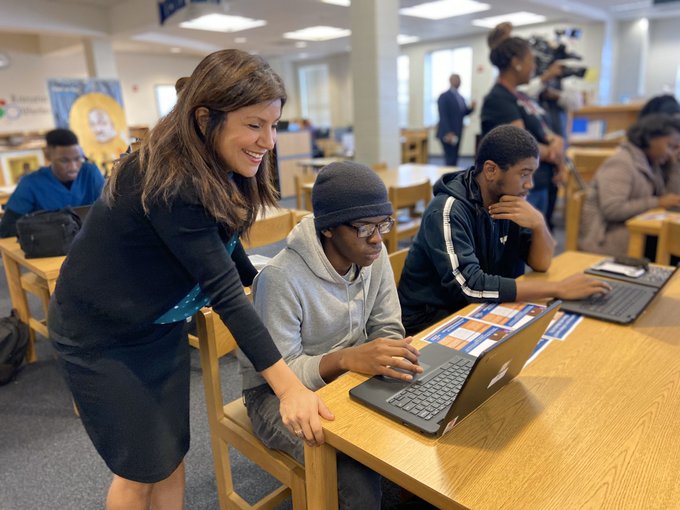New Tech Helps APS Students Challenge Themselves for Better College Success

Growing up, I played tennis. I wasn’t very good, but I learned a lot about myself, especially about how external challenges impacted my performance. Because of my rank on the team, I was often matched to compete against lower-ranked players at tournaments. And frequently, when I played an opponent I should have easily beaten, I lost. I wasn’t motivated, nor did I have the confidence in myself to try to win.
Once in a while, though, I’d play a top-ranked player, and ironically, would play harder and better. My game was stronger because I was motivated by the challenge.
Turns out I was experiencing something that aligns with an important finding from research on human motivation: Challenge has a positive impact on motivation. I now know that to stay motivated, I need to challenge myself in my life and work.
Similarly, at Achieve Atlanta, we talk a lot about bold expectations for ourselves and the students and families we serve. But during the last few years of working with students, we observed something troubling: Too many Atlanta Public School (APS) students weren’t setting bold expectations for their college careers. They were undermatching when it came to deciding where to go to college.
The Undermatching Paradox
Undermatching occurs when students enroll in colleges for which they are overqualified. It can reduce the likelihood of their earning a college degree and affect long-term social mobility. In fact, a study by the American Educational Research Association found that students who undermatch are less likely to graduate on time than students who go to colleges that match their abilities.
This might seem counterintuitive. Shouldn’t students graduate at higher rates if they go to schools that are less challenging than what they can handle? Surprisingly, the answer is no. One reason is that data show that schools where “undermatched” students attend typically lack the resources of more competitive institutions. Perhaps another reason is that students who undermatch find themselves not sufficiently challenged to stay motivated.
So why do students undermatch? Through the support of the Bill & Melinda Gates Foundation, we dug into this question for APS students. We reviewed the research and held several focus groups with APS counselors and students. We learned there are three main reasons students undermatch:
- Students and families lack information about which colleges are a good academic match for students. While there is ton of general information about colleges on the internet and elsewhere, it’s difficult to sort through it and make an informed decision about which colleges to consider.
- For many students, the primary factor for choosing where to go to college is cost, and they assume less competitive institutions will cost less. What students don’t know is that often the more competitive colleges can end up costing less because of the financial aid they are able to provide.
- Finally, counselors explained that many students don’t want to apply to a “reach” school because they don’t want to make themselves vulnerable to rejection. It’s scary to put your dreams out there.

A New Tool for Making Better College Matches
We have an unwavering belief in what our students can achieve when given the resources and opportunities to thrive. That’s why we are excited to announce the launch of the Match & Fit List Builder, an online college advising tool designed by Achieve Atlanta and APS. The Match & Fit List Builder uses APS student-specific data to help each student build a list of postsecondary options that best match their academic qualifications, and fit their personal, social and financial needs.
The new tool incorporates the art and science of college advising to keep students, especially low-income students, from undermatching. And, perhaps most importantly, by showing which colleges students match to, the Match & Fit List Builder shows students what’s possible and helps counselors, parents and guardians encourage students to take risks in order to increase their chances of success.
We all know that when challenged appropriately, APS students play harder and stronger. Let’s keep motivating them to put their dreams out there. We can’t wait to see what they will achieve!